- Home
- M G Vassanji
And Home Was Kariakoo Page 13
And Home Was Kariakoo Read online
Page 13
A Question of Language, Understanding, and Truth
One obvious question that arises regarding the journeys is, how good was the communication among the various parties involved?—those who helped to organize the caravans, those who went with them, those in whose lands these strangers arrived. Burton, Speke, and Grant, having spent time in British India, all spoke Hindustani—the older and more vernacular form of Hindi and Urdu—and reportedly could communicate with Sidi Mubarak in that language. Yet none of these four men was its native speaker. Sidi had spent time with Kutchis and would have spoken Kutchi better, though hardly like a native. One can only imagine the confusion and misunderstanding that arose, the more so when whatever Hindustani was spoken was translated into Swahili or English, or even some of the other languages. One imagines a mixture of Swahili, Hindustani, and English used to communicate, along with hand gestures. Sidi Mubarak was a man of the coast and would have been fluent in Swahili. But until quite recently many peoples in the interior did not speak or spoke only a little Swahili. It is far from obvious that Sidi could make himself completely understood to a Mgogo or a Mha. And yet the problems of communication were entirely glossed over, by either the travellers themselves or their numerous commentators and admirers.
Burton writes the first name (actually a word describing Africans in India) of Sidi Bombay as “Seedy,” and in an article in Blackwood’s as “Sudy”; in Zanzibar, he writes it as “Sidi.” Grant calls him “Seedee.” This seems a minor point but it surely reflects the levels of misunderstanding possible, simply on the basis of pronunciation. Burton’s Kutchi quotation in Lakes sounds marvellous, and one can only admire his linguistic skills, yet it is not entirely correct. Imagine Speke’s message in English and broken Hindi, conveyed to Sidi Mubarak, fluent in neither, and reaching a Mgogo via a Swahili in which he is not fluent.
And then, how good was the understanding outside of language; whose word do we, as modern readers, take? If Burton and Speke do not always tell the same story, and Stanley takes time repudiating Burton (concerning the features of Sidi Mubarak, for example), how much can we trust their accounts of the Africans, Asians, and Arabs? Burton was often contradictory; he was moody and depressive. Sickness made these men delirious. As Burton describes one instance, “I had during the fever-fit, and often for hours afterwards, a queer conviction of divided identity, never ceasing to be two persons that generally thwarted and opposed each other; the sleepless nights brought with them horrid visions, animals of grisliest form, hag-like women and men with heads protruding from their breasts.” At the same time Speke had a fainting fit “which seemed to permanently affect his brain.” And further, how much of what they report is what they saw and how much was overheard? How much was tall tale? How much was received or written down under the influence of alcohol or rage or fever; how much was reported to them out of fear, spite, a need to please? Did they always know when a native was pulling their leg, in the Swahili manner of “kutania”?
There was a clear power relationship during these long, arduous journeys: the white man was the boss, the black man the servant; obedience was exacted with punishment that could be cruel and humiliating. As Stanley says of Sidi Mubarak, when he hires him in Zanzibar,
An ugly rent in the front row of Bombay’s teeth was made with the clenched fist of Capt Speke in Uganda, when his master’s patience was worn out, and prompt punishment became necessary … months afterwards, I was called upon to administer punishment to him myself.…
Speke of course makes no mention of this incident. And although Stanley says he has black friends in America, he himself had Sidi Mubarak flogged on at least two occasions and even put in chains. We should not forget that Sidi, in Stanley’s time, was a captain of the caravan, an elderly man—a “mzee.” Stanley’s attitude, perhaps under stress, reminds one of a slave owner, patronizing yet harsh, the slave’s dignity at the hands of the master.
Animal comparisons demean even the most courageous and helpful of the Africans, reflecting perhaps Victorian anthropology; painting Africa in strictly black and white terms catered to the voracious appetites of a public for these accounts of heroic adventures. Twenty-seven years after the East African Expedition, H. Rider Haggard would begin to publish his wildly popular adventure novels set in Africa. At about the same time began the “Scramble for Africa,” when much of the continent was portioned off.
11.
The Old Westbound Caravan Route
FRANTIC UBUNGO STATION, early in a Dar es Salaam morning, hums with the growls of a dozen buses arrayed in rows, impatient like hounds to fan out across the country. It’s a vast terminus, outside the city; simply to arrive here is an ordeal. But the sheer volume of transport necessitates its location. Vendors weave in and out with their small goods, touts shout their destinations.
“Mwalimu, where are you?” I ask over the cell. “I’m here, Daktari,” Joseph informs me, “I’ve just arrived.” I tell him I’m waiting beside our bus and where to find it. Soon I see him approach, pushing through the crowds, a bag on his shoulder, and go to meet him. It’s been four years since we last met, in Nairobi, though we’ve corresponded in the meantime. “Let’s have tea,” I suggest, “there’s still time.” We sit down at a tea stall, renew familiarity, and then get on our bus and are soon on our way.
A thrilling feeling, a wonderful excitement, takes hold of us—the sun bright and the air cool, the familiar coastal vegetation rushing by, villages and farms in the midst of their morning rituals, and the wheels rolling on the earth beneath our feet. We’re headed west, our cares are behind us, and we chat like schoolboys. The entire country, the entire continent stretches out ahead.
The highway follows the Central Line, the railway built in the years 1905 to 1914 by the Germans. For some reason of convenience the railway headed out straight westwards from Dar, along a sparsely populated plain, instead of following the populous bend of the Ruvu (Kingani) valley, which route the caravans and the European explorers had taken in the past. Burton’s “Slough of Despond,” the busy station of Zungumero on the caravan route, was therefore bypassed. Instead there grew Morogoro, which if it had existed before was too insignificant to be mentioned by the travellers. Zungumero I cannot find on any map now.
I first travelled on this road in a rattling old green-and-beige Albion with my mother and brother, on our way to Nairobi. I was ten, he twelve. The month was December and schools were out. I had been promised a sea voyage to Mombasa, thence a train to Nairobi, but this road trip was all that proved possible. On the way to Morogoro the bus got mired in a muddy stretch, from which it had to be pushed out with much heave-ho, and we reached the town in the evening, twelve hours after starting out. We had travelled 120 miles. My mother had a cousin in town, so we washed and had dinner at her place before proceeding. On the northern branch road to Kenya the bus got stuck again, but there was another cousin somewhere who fed us. It was a memorable journey, my first one out of Dar; there were giraffes, zebras, deer, and elephants on the way, and I recall being restrained from sticking my head and shoulders out to watch the passing scenery. My brother never knew until the last day that he would be left behind at a “Boarding” in Mombasa on the way back. That changed us all.
Almost all the roads are paved now—thanks to the Chinese—reaching every corner of the country, and the bus terminals are as busy as airports are elsewhere. With efficiency, good roads, and comfortable buses comes another modern development—we don’t have to enter the towns we pass. Time is saved, but something surely is lost. We say adieu to Morogoro without entering it, picking up passengers at the terminal outside the town. The Uluguru hills rise in the blue mists in the distance; the earth is red, the sky a trembling translucence in the heat. Past Morogoro we enter the land of the Gogo people; the terrain is flat, the vegetation sparse, thorny and nondescript. This is an arid region, prone to droughts, which is why not very long ago the Gogo would come to Dar in such large numbers to beg at the shops. The Gogo are a tall, lan
ky people who keep herds by custom. They were a feared people in the nineteenth century; caravans dreaded the prospect of crossing their land, for which they would be subject to heavy hongo, or tax, in the form of cloth, beads, and wire. In 1857, we recall, the Indian businessman Ladha Damji of Zanzibar did not put much stock in Richard Burton’s party advancing through this region. Burton says that while neighbouring peoples wrapped themselves in grass or skin, the Gogo proudly wore cloth; many wore leather sandals. They were doing well.
The urban centre of the region is Dodoma. It was made into the nation’s capital in 1996. In my childhood the town was known for two things: the nation’s best pedas—the Indian sweets—came from Dodoma, made by one or two Indian families; and all the “crazies” went to Dodoma, to the only mental hospital in the country. Dodoma was thus a euphemism for madness. But later, laughable Dodoma became for me a place of very special and vivid memories. I did the military part of my National Service in this area, at a camp just off the highway. Asian youths hated the idea of being forced to go into the jungle immediately after high school, to eat the most rudimentary food and march about aimlessly in the sun—but the experience turned out to be profoundly, positively transforming. It gave us the opportunity to travel into the country and live with young people from different places and backgrounds.
Every National Service camp had its own peculiarities; Ruvu had lions lurking just outside. In Dodoma, a daily horror—until we hardened ourselves to it—was the sight of starving Gogo villagers waiting anxiously for us to finish our meals so they could get the leftovers. Sitting outdoors on the ground, we ate from aluminum mess tins. The moment you stood up, finished with your meal, a bunch of desperate Gogo spectators would come racing towards you, men, women, and children, grandmas, grandpas, and toddlers, arms stretched out, begging for the leftovers. You had to select from the staring faces whom to give your leftovers to. If you lacked the steel to face such a crowd and opted simply to go and throw the remains away in the grass, a crowd of the beggars would make a rush for it: maize meal and beans, boring but healthy food in generous government helpings for city-bred young men and women training to build and defend the nation. Our pathetic audience were skin and bones, barefoot and covered in rags and blankets, their faces unwashed and eyes often diseased. How more memorably awakening could our experience of the nation have been? How more humbling?
There were fun moments too, daring escapes we still talk about, into the town to get away from the camp’s rigorous monotony. A few times I asked permission to go to the government hospital and, after the consultation there, would have lunch with a friend at the posh Dodoma Hotel, which I could not really afford. We would arrive here in our military uniforms. There were white tablecloths, the service was formal, and we ate English fare with forks and knives. I had never been to such a place before, but my friend seemed undaunted. She had a tooth problem and a couple of times I feigned that malady to accompany her, and allowed myself to suffer a gratuitous drilling from a rather confused dentist.
We reach Dodoma at 4 p.m. and head for—where else but—the Dodoma Hotel. It is situated at the end of a quiet, shady street away from the town and behind the station, just as I remember it, but evidently has been remodelled since my visits. The rooms, sprayed with insecticide, are good but not luxurious, constructed around a square courtyard at the back. Meals are served mostly in the courtyard, but there is a dining hall towards the front in which I discern the place where I would come for that English lunch.
(Photo Caption 11.1)
After a journey of eight and a half hours, having showered, we happily sit down to a few beers and a lavish Indian dinner in the courtyard. There are only a few other guests. The night is cool, the sky above us dark and clear; it is eerily quiet. What we have to beware of are the mosquitoes.
We’ve hit it off completely, Joseph and I. He’s chatty and knowledgeable, with a sense of humour. To come with me he’s had to delegate his extensive teaching duties and bear the wrath of his first and the critiques of his second wife. He married the first one when he was only twenty, has two children by her, a boy and a girl. She’s kept the boy, “of course,” and given him the girl, who is twelve and very close to him; knowing he’s away in Dar, probably having fun, the first wife has demanded more money. The second wife is recent and they have a little boy. She too demands more money. “You wonder if it’s worth getting married.” He has a doctorate in literature from Berlin. When he arrived there first, he says, there was no one to receive him at the airport, everyone he turned to would say words equivalent to “No English” and turn away. He waited for taxis, but all that arrived were Mercedes-Benzes, which he imagined would charge him more. No Toyotas or Nissans! Finally he took a Benz and arrived at the train station. No one to help him get a ticket to Leipzig, where he had to spend the first few months to learn German, until at long last he found a Moroccan worker who helped him. He arrived in Leipzig station in the middle of the night to see a bunch of skinheads busy making a ruckus. He waited nervously at a McDonald’s, and when morning came took a taxi to his university department. In four and a half years he was never invited to a colleague’s house; he frequented an African bar where he heard all kinds of “narratives,” the stories of lonely Africans in Europe. There was a Camerounian who went to Nigeria, crossed the Sahara to Libya, waited until a boat took him to Italy, worked at an orange farm in Spain, walked to Austria, and finally arrived in Munich, where he was immediately arrested and deported. Now he was back.
I have with me a fine storyteller.
It’s rained all night and I worry about our journey onwards. The plan is to go to Tabora tomorrow, and then onward to Kigoma and Lake Tanganyika, following the old caravan route. We step out into a quiet, shady street. The morning is cool and dry, pleasant to walk. We are at 3,600 feet above sea level and the sun sets later here than in Dar.
If there was hope that moving the nation’s capital to impoverished Dodoma would charm it into a burgeoning city and change its fortunes, this has not happened. Like other purely political capitals, there is the sense of a quiet, tidy dullness, of seasonal activity, which explains why our hotel is almost empty. Parliament is not in session. Dodoma did not exist before colonial times; like Nairobi it is what the railway left behind. But Nairobi prospered.
First thing, we walk up to the bus station. On the way we pass an opulent two-storey white building with a dome, a structure dominating a major intersection. It’s the “jamatini,” the Khoja prayer house, or khano. One of the cross streets is named Jamatini, so is the dala-dala (bus) stop. A man inside the gates tells me there are about 150 Khoja Ismailis in town. At one time there would have been a thousand. We walk onward, passing a row of young Masai “doctors” from the north, men in traditional red or brown togalike body covers sitting under the trees on the sidewalk, selling local medicines for potency, good luck, and the like—you are shown a printed list of ailments they can cure that is as long as the menu of a Chinese restaurant. Business appears to be not bad.
At the station, we face a dilemma. Kigoma via Tabora, following the caravan route, is a tempting destination. Tabora is the Kazeh of former times. Kigoma is close to Ujiji at Lake Tanganyika, the actual caravan stop and slave market. Opinion is universal among the touts, however, that the road all the way to Kigoma is unpassable due to the rains. We decide to get tickets for Nzega, a three-way junction, and there to decide which direction to turn: north will take us to Mwanza and Lake Victoria; south will take us to Tabora and perhaps, with only the slightest chance, on to Kigoma.
We come back to Jamatini, choose to turn left and head towards the mental hospital. It’s a long walk away and finally we arrive at the gate, from which a road leads inside. The hospital grounds are quiet and look well tended; two men guard the gate. A vehicle goes in, a small bus comes out. We have no desire to go inside, and return to Jamatini by taxi.
On the other side of the prayer house is the town’s business section. It could not have changed much
from when I knew it—a few intersecting streets and moderately busy. There must be a chai place here, I tell Joseph, and he looks surprised. How do I know? Obviously we have enough to learn from each other. Where there are a few Asians, there is a chai place, I explain to him. He’s all for it. We ask around and are finally escorted by a young man to a rather small, narrow joint, run by an Asian woman, serving the usual fare: kababs, samosas, bhajias, and chai. We sit down and are served. This food is a revelation to my friend, he’s not had it before; soon he’ll become addicted to it. But instead of chai he prefers soda.
On our way to Dodoma, at the road stops, boy vendors would come by to the windows offering fried termites for sale. Termites, says Joseph, are a delicacy, raw or fried; in the latter case they taste like chicken. His folk spice them with chilies. He is from the Bukusu, a Bantu people. They live in northwest Kenya by Lake Victoria. Some years ago, he says, a Meru district officer (DO) was sent to their area and created havoc, imposing his alien ways upon them. Driving around in his Land Rover with two bodyguards, he came upon some elders outside the village gorging themselves upon a termite mound, and assumed they were drunk. He arrested them for “loitering with intent”—a grin comes over Joseph’s face at the ludicrousness of it, but it’s a crime in the books introduced in colonial times, presumably to restrict the Africans to their neighbourhoods. Another time this same Meru DO came upon a gathering of villagers drinking the local brew. The custom is for the youngest wife to sit in front of her husband, between his legs, while he drinks his beer. She’s his favourite. The DO was furious, convened a kangaroo court right there, and had an elder whipped. “First you drink illicit alcohol, then on top of that you rascals rape your young women!” There was an uprising and the DO was withdrawn.

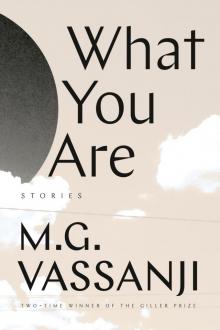 What You Are
What You Are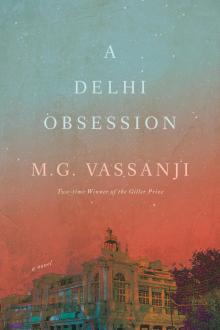 A Delhi Obsession
A Delhi Obsession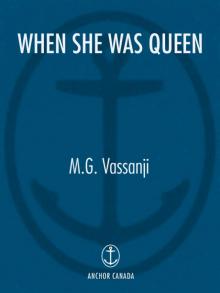 When She Was Queen
When She Was Queen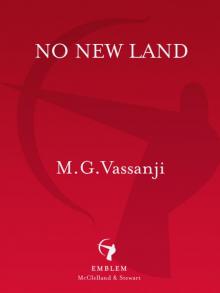 No New Land
No New Land Nostalgia
Nostalgia Mordecai Richler
Mordecai Richler The Book of Secrets
The Book of Secrets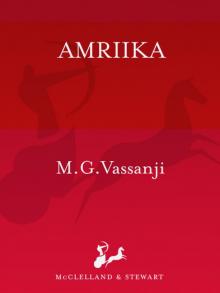 Amriika
Amriika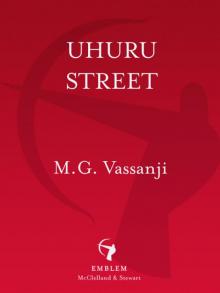 Uhuru Street
Uhuru Street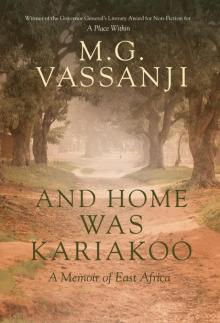 And Home Was Kariakoo
And Home Was Kariakoo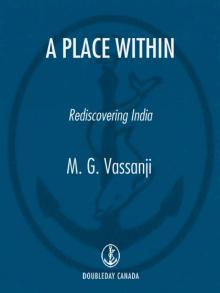 A Place Within
A Place Within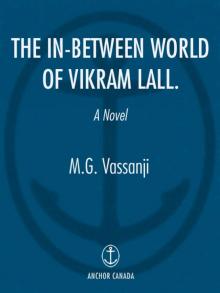 The In-Between World of Vikram Lall
The In-Between World of Vikram Lall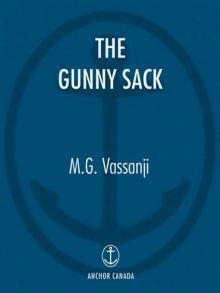 The Gunny Sack
The Gunny Sack